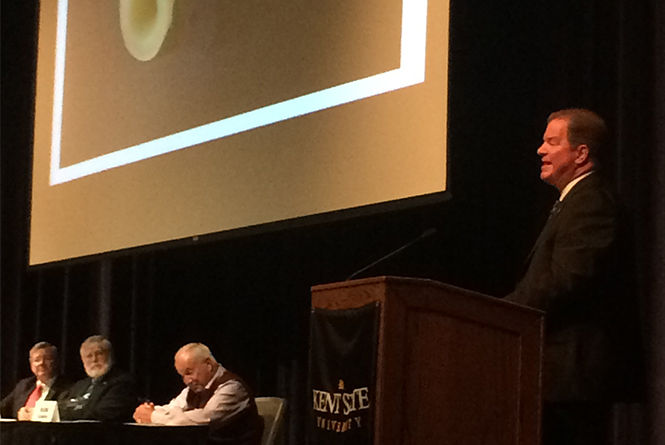Local business owners share how they expand Kent’s global footprint
Bob Oborn, a Kent State alumnus and president of Kent Elasomer Products, explains how his business has impacted the local and global economy at the Bowman Breakfast on Wednesday, April 1, 2015.
April 1, 2015
Rubber bands for braces, technology that stabilizes Buckingham Palace, material-handling equipment for the Marine Corps and liquid crystal technology that detects Ebola have one common element — they’re all manufactured in Kent.
“People just don’t realize these successful businesses and the impact of these businesses that are located here in Kent,” said Lori Wemhoff, executive director of the Kent Area Chamber of Commerce. “They realize the importance of people, and their employees work here and live here and shop here and that’s that cycle of the whole impact on the local economy.”
Both Kent State administrators and Kent-area business professionals learned about these innovations and the minds behind them Wednesday morning in the Student Center Ballroom at the university’s semi-annual Bowman Breakfast, a gathering that showcases town-gown relations.
Four local business owners, whom Kent State President Beverly Warren commended for being “visionaries,” shared how their companies are not only making a local but also a global impact and putting the city of Kent on the map.
“They are beacons of hope for all future entrepreneurs,” she said.
Tom Myers, president of Davey Drill, told the crowd that his company’s drill rigs, manufactured in Portage County, are used in building projects and construction sites on five continents. The machinery has helped to not only stabilize Buckingham Palace but also to keep Las Vegas hotels and casinos, such as Mandalay Bay, from sinking.
Myers, whose great-grandfather is responsible for creating the Davey Tree Expert Company in downtown Kent, said his company’s equipment also served as a “first responder” after the Sept. 11 terrorist attacks. Its drill rigs helped reconstruct New York City’s subway tunnels under the World Trade Center.
“We’re sensitive to the fact that people don’t see our best work,” said Myers about his company’s machinery, often located underground.
Gary Niehaus, chief scientist at Crystal Diagnostics and professor of physiology at Northeast Ohio Medical University, explained how he worked with Kent State’s Liquid Crystal Institute to create a device that detects harmful bacteria and viruses in food and the human body.
“All of the individuals who are invested in it are employees of university,” said Niehaus, who said his lab has hired Kent State graduates. “At the very beginning, our guidance as far as our business model and so forth were provided by the vice president of research, and there has been a great deal of support all along from NEOMED and Kent State.”
He said the bacteria-detecting technology is FDA-certified to identify the bacteria E. Coli on lettuce and spinach and can also spot one of the seven proteins of the Ebola virus. He said the devices’ ability detect for Ebola will be tested in the coming weeks.
“Just now we’re moving our technology into the market,” said Niehaus, who has eight patents and 20 published works investigating bacterial infections to his name. “It’s kind of fun for an old codger like me to describe myself as a new kid (in the industry).”
Bob Oborn, a Kent State alumnus and president of Kent Elastomer Products, said his company’s plastic and latex products — from rubber bands used for braces to pumps that dispense condiments ranging from nacho cheese to ketchup — have helped his business become a $32 million venture.
Part of the company’s worldwide success, Oborn said, is credited to its sustainability efforts, which helped it win the 2014 Ohio EPA Encouraging Environmental Excellence Silver Level Award.
Joe Zeno, 37-year president and CEO of ACS Industries, said the machine attachment solutions company had a negative net worth when it hired him in 1974. Since 1976, he’s made the company profitable by taking risks.
“The core of our business is innovation,” he said. “We focus our business on where there is pain and tension. We sit down with those markets and figure out a better way (they can operate).”
Zeno said this mindset has helped the company expand globally as its hot slag buckets, used to dispose of waste in the steelmaking process, are in countries such as Saudi Arabia and Italy and make up 80 percent of the industry in the U.S.
Contact Madeleine Winer at [email protected].












